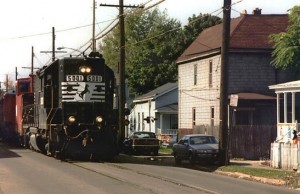Island of Enchantment
 The child who sang all the time at age 4 is now the woman who sings all the time at 40. After over 20 years away, returning home to Puerto Rico means hearing old stories again as if they were new.
The child who sang all the time at age 4 is now the woman who sings all the time at 40. After over 20 years away, returning home to Puerto Rico means hearing old stories again as if they were new.
• Her great grandfather, a ship-jumping Spanish German Jew, hid in a barrel and sailed from the Canary Islands to Puerto Rico… long before that, Taino Indian slaves were supposedly heard to cry, “Take me back to Peru!”
• We may never know if anyone ever called Ponce de Leon a ponce as a common noun, but plenty have followed him — and preceded him — to Puerto Rico, the Island of Enchantment, or Isla de Encanto in Spanish.
• Ceaseless marches of songs on the radio proclaim, “I’m going to Puerto Rico,” or “I’m in Puerto Rico,” or, as if in a sudden moment of discovery, “Hey, I’m Puerto Rican!”
• Rarely is there a jump or leap the lost cats of Puerto Rico grow afraid to attempt.
• For three nights, her mother once heard a cry in the night she thought caused by kids playing around, possibly even a ghost, and instead was a woman discovered cut to death, pieces of her skewered body hanging from the sharp leaves of the cane fields.
• But there is also the story of the man in the countryside who fell gravely ill and apparently passed away only to later rise and walk around the house. After this phenomenon recurred a few more times, the wife told guests, “Don’t touch him — you’ll wake him up again!”
• The sing-song manner of speaking inherited from Africa.
• Long ago when they were young, her mother and aunts drove off a cliff by the waterfall near their town, the car tumbling and tumbling, the soon-to-be-referenced “crazy” sister shielding her one-year-old niece in the car with her body, another pregnant sister dying with her fetus from the crash. Decades later, the crazy aunt still says to her niece who survived the crash, “I saved your life, and still you never call!”
• The tropical rain forest crowds you in hues of greens, holds you in its sleeve, and, when you breathe, it breathes too.
• The niece who survived the crash would later declare herself independent as an 18-year-old in order to fight for her home against her stepmother, with she and her two college girlfriends rebuilding the damaged house on their own every weekend.
• A storm pushes the Atlantic closer to the hotels and restaurants of San Juan, and from a bar’s wall of windows, its soft, big blue waves roll down and toss swimmers around like goldfish in an aquarium.
• It was later discovered the crazy aunt may have not really been crazy. While everyone else in the car was rushed to the hospital, she was sent home with a skull fracture that slowly leaked and destroyed brain cells for 20 years. Her husband took up with the housekeeper he hired to manage his wife and they both abandoned her. The kids, ill-supervised by their mother, started burning mattresses and raising hell, until the older brother discovered sexuality at 11 and began abusing his 5-year-old sister.
• The older man hitchhiking in the mountains who gave us directions to an isolated restaurant and said “God wanted you to get lost so you could give me a ride,” in addition to repeatedly remarking in the back of the car, “you gotta buy a ticket before you get on the plane.”
• Leading a trail of traffic up a steep road in the mountain country: A seven-year-old boy galloping on horseback
• The father she has no photograph of, knifed to death on a baseball field long ago.
• An artesan driving a pick-up full of his wares through the neighborhoods, a recording of “c-a-n-a-s-t-a-s, canastas” blaring from his speakers — or “b-a-s-k-e-t-s, baskets” — almost as lonely as the words “…still, you never call.”
The child who sang at 4 is now the woman who sings at 40.





